-
06-14-2024
Duração e qualidade do sono da equipe de enfermagem brasileira que trabalha em turnos
Revista Brasileira de Enfermagem. 2024;77(2):e20230167
Abstract
Duração e qualidade do sono da equipe de enfermagem brasileira que trabalha em turnos
Revista Brasileira de Enfermagem. 2024;77(2):e20230167
DOI 10.1590/0034-7167-2023-0167
Views0See moreRESUMEN
Objetivo:
analizar la duración y calidad del sueño en profesionales de enfermería que trabajan por turnos.
Método:
investigación analítica, transversal, realizada entre septiembre de 2017 y abril de 2018, en un hospital público del sur de Brasil, con el equipo de enfermería. Se utilizó el cuestionario sociolaboral y de síntomas de salud, la Escala de Somnolencia de Epworth y el Índice de Calidad del Sueño de Pittsburgh. Los datos se presentan como estadística descriptiva e inferencial, análisis bivariado y regresión logística binaria.
Resultados:
participaron 308 profesionales de enfermería, con predominio de sueño prolongado, ausencia de somnolencia y mala calidad del sueño. La duración corta del sueño (<6 h) se asoció con turnos de día y mala calidad del sueño. La calidad del sueño se asoció con la presencia de somnolencia diurna excesiva y con el trabajo diurno.
Conclusión:
los turnos de trabajo, el insomnio y la cefalea fueron los principales factores relacionados con la falta de sueño de los profesionales de enfermería. Los resultados pueden justificar el desarrollo de investigaciones de intervención para la salud de los trabajadores.
-
ORIGINAL ARTICLE06-14-2024
Sleep duration and quality of Brazilian nursing staff who work in shifts
Revista Brasileira de Enfermagem. 2024;77(2):e20230167
Abstract
ORIGINAL ARTICLESleep duration and quality of Brazilian nursing staff who work in shifts
Revista Brasileira de Enfermagem. 2024;77(2):e20230167
DOI 10.1590/0034-7167-2023-0167
Views0See moreABSTRACT
Objective:
to analyze sleep duration and sleep quality in nursing professionals who work in shifts.
Method:
this is a cross-sectional, analytical research, carried out between September 2017 and April 2018, at a public hospital in southern Brazil, with the nursing team. A socio-occupational and health symptoms questionnaire, the Epworth Sleepiness Scale, and the Pittsburgh Sleep Quality Index were used. Data are presented as descriptive and inferential statistics, bivariate analysis, and binary logistic regression.
Results:
participants were 308 nursing professionals with a predominance of long-term sleep, absence of drowsiness, and poor sleep quality. Short-term sleep (<6h) was associated with day shift and poor sleep quality. Sleep quality was associated with presence excessive daytime sleepiness and work day shift.
Conclusion:
work shift, insomnia and headache were the main factors related short-term sleep for nursing professionals. The results may justify the development of intervention research for workers’ health.
-
ORIGINAL ARTICLE06-14-2024
Translation and Cross-Cultural Adaptation of the LYMPH-ICF Instrument for Lymphedema into Portuguese/Brazil
Revista Brasileira de Enfermagem. 2024;77(2):e20230137
Abstract
ORIGINAL ARTICLETranslation and Cross-Cultural Adaptation of the LYMPH-ICF Instrument for Lymphedema into Portuguese/Brazil
Revista Brasileira de Enfermagem. 2024;77(2):e20230137
DOI 10.1590/0034-7167-2023-0137
Views0See moreABSTRACT
Objective:
The aim of this study is to cross-culturally adapt the Lymphoedema Functioning, Disability and Health Questionnaire Lymphoedema (LYMPH-ICF) instrument into Brazilian Portuguese and conduct a pilot application (n = 10), without psychometric pretensions.
Method:
Methodological research was conducted, following the steps of translation, synthesis, back-translation, and evaluation by the expert committee. Two translators, two back-translators, and twelve professionals participated in the expert committee. A pretest was carried out with 10 patients with secondary lymphedema due to breast cancer. The degree of agreement was determined by the content validity coefficient.
Results:
It was necessary to modify 8 out of the 29 questions comprising the questionnaire, which exhibited idiomatic disagreement. However, despite these changes, there were no indications of impairments, as content reliability was achieved through a validity coefficient of 0.90.
Final Considerations:
The instrument was successfully translated and cross-culturally adapted for Brazil with a high level of agreement.
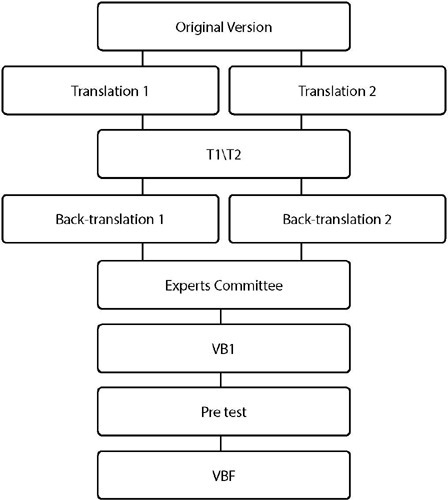
-
ORIGINAL ARTICLE05-27-2024
Fall Tailoring Interventions for Patient Safety Brazil Program: an evaluability study in a teaching hospital
Revista Brasileira de Enfermagem. 2024;77(2):e20230348
Abstract
ORIGINAL ARTICLEFall Tailoring Interventions for Patient Safety Brazil Program: an evaluability study in a teaching hospital
Revista Brasileira de Enfermagem. 2024;77(2):e20230348
DOI 10.1590/0034-7167-2023-0348
Views0See moreABSTRACT
Objectives:
to present the theoretical model, logic model, and the analysis and judgment matrix of the Fall TIPS Brazil Program.
Methods:
a qualitative, participatory research approach, in the form of an evaluability study, encompassing the phases (1) problem analysis; (2) program design, development, and adaptation to the Brazilian context; (3) program dissemination. Data were collected through document analysis and workshops.
Results:
through document analysis, workshops with stakeholders from the participating institution, and validation with key informants, it was possible to identify the program’s objectives, expected outcomes, and the target audience. This allowed the construction of theoretical and logic models and, through evaluative questions, the identification of indicators for the evaluation of the Fall TIPS Brazil Program.
Final Considerations:
this study has provided insights into the Fall TIPS program, the topic of hospital fall prevention, and the proposed models and indicators can be employed in the implementation and future evaluative processes of the program.
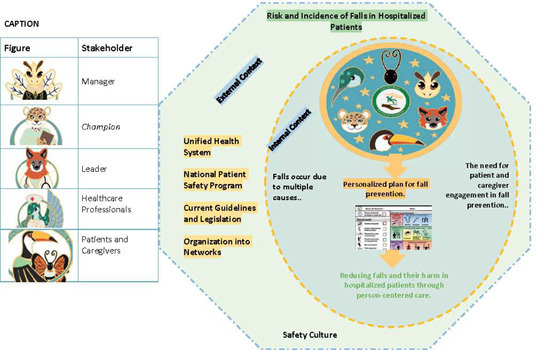
-
ORIGINAL ARTICLE05-27-2024
Nursing care protocol for critical users with tracheostomy under mechanical ventilation
Revista Brasileira de Enfermagem. 2024;77(2):e20230337
Abstract
ORIGINAL ARTICLENursing care protocol for critical users with tracheostomy under mechanical ventilation
Revista Brasileira de Enfermagem. 2024;77(2):e20230337
DOI 10.1590/0034-7167-2023-0337
Views0See moreABSTRACT
Objectives:
to develop and assess a nursing care protocol for critically ill users with tracheostomy under mechanical ventilation.
Methods:
a methodological study, developed through two phases, guided by the 5W2H management tool: I) target audience characterization and II) technology development.
Results:
thirty-four nursing professionals participated in this study, who presented educational demands in relation to care for critical users with tracheostomy, with an emphasis on standardizing care through a protocol and carrying out continuing education.
Final Considerations:
the creation and validity of new technologies aimed at this purpose enhanced the participation of nursing professionals and their empowerment in the health institution’s microsectoral actions and in macrosectoral actions, highlighting the need for public policies that guarantee the conduct of a line of care for users with tracheostomy.
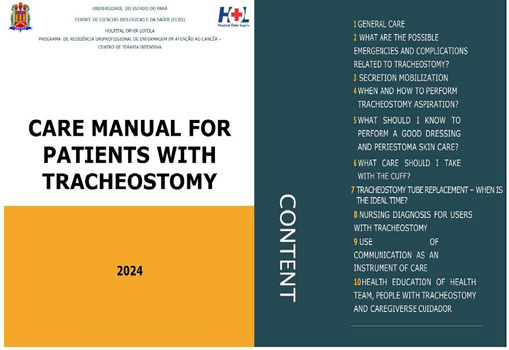
-
ORIGINAL ARTICLE05-27-2024
Assessment of educational technology in lactation physiology by health students
Revista Brasileira de Enfermagem. 2024;77(2):e20230252
Abstract
ORIGINAL ARTICLEAssessment of educational technology in lactation physiology by health students
Revista Brasileira de Enfermagem. 2024;77(2):e20230252
DOI 10.1590/0034-7167-2023-0252
Views0See moreABSTRACT
Objectives:
to assess the suitability, facilitators, and barriers of using a video clip for teaching lactation physiology to health students.
Methods:
a cross-sectional study was conducted with online data collection at a higher education institution, using the Assistive Technology Assessment Instrument and open-ended questions. The sample consisted of 88 students.
Results:
the video clip was deemed suitable in all attributes. Facilitators identified included attractiveness, musicality, and ease of access. Barriers noted were the music’s speed and the necessity for prior knowledge. The video clip achieved adequate scores for interactivity (1.71), purpose (1.77), relevance (1.64), and clarity (1.77). The overall average of the attributes was 1.72.
Conclusions:
the video clip can serve as an effective learning strategy to enhance hybrid education, potentially contributing to the promotion and support of breastfeeding. However, some barriers underscore the importance of prior knowledge for a complete understanding of the content.
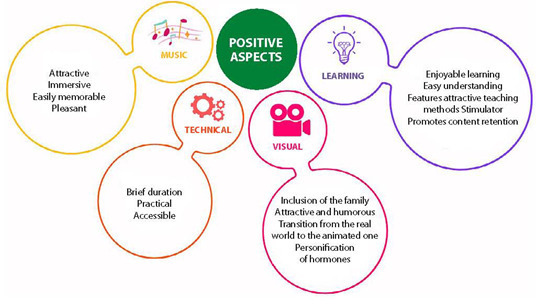
-
ORIGINAL ARTICLE05-27-2024
Technology for nursing care in a Maternal Intensive Care Unit: a methodological study
Revista Brasileira de Enfermagem. 2024;77(2):e20230202
Abstract
ORIGINAL ARTICLETechnology for nursing care in a Maternal Intensive Care Unit: a methodological study
Revista Brasileira de Enfermagem. 2024;77(2):e20230202
DOI 10.1590/0034-7167-2023-0202
Views0See moreABSTRACT
Objectives:
to develop and validate a nursing care plan in a Maternal Intensive Care Unit.
Methods:
a methodological study, developed in stages: integrative review; Nursing History construction; care plan restructuring; appearance and content validity by judges.
Results:
the history was organized into sections: Identification; Basic Human Needs; Physical Examination; and Assessment of Basic Human Needs. A care plan was restructured with 34 diagnoses, organized according to basic human needs. A satisfactory level of appearance validity of the history and care plan was obtained (Concordance Index varying between 86.3 and 100 for both instruments), and content validity with average indexes of 90.8 and 92.8, respectively. Thirty-four diagnoses, their interventions and nursing actions were consolidated.
Conclusions:
the instruments were considered relevant and pertinent in terms of appearance and content, and their use in the institution under study as well as in other similar services may be recommended.
-
05-13-2024
Metodologia qualitativa: considerações e singularidades sobre a implementação de intervenções centradas na pessoa
Revista Brasileira de Enfermagem. 2024;77(3):e770301
Abstract
Metodologia qualitativa: considerações e singularidades sobre a implementação de intervenções centradas na pessoa
Revista Brasileira de Enfermagem. 2024;77(3):e770301
DOI 10.1590/0034-7167.2024770301pt
Views0A investigação qualitativa em saúde permite a compreensão aprofundada de como a pessoa experiencia as diferentes transições de saúde, a relação com os profissionais de saúde e a passagem pelos diferentes ambientes de prática clínica. Concomitantemente, tem o potencial de suportar a tomada de decisão clínica dos profissionais e de empoderar o cidadão na sua […]See more
-
01-01-2016
ERRATUM
Revista Brasileira de Enfermagem. 2016;69(1):206-206
Abstract
ERRATUM
Revista Brasileira de Enfermagem. 2016;69(1):206-206
DOI 10.1590/0034-7167.20166901e02
Views0In the article “Conceptions of mid-level nursing professionals facing those with a chemical dependency”, with the number of DOI: 10.1590/0034-7167.2015680610i, published in the journal Revista Brasileira de Enfermagem, v68(6):755-60, page 760 that read:“8. Vargas D, Soares J. Knowledge and attitudes of nurses towards alcohol and related problems: the impact of an educational intervention. Rev Esc […]See more -
01-01-2016
ERRATUM
Revista Brasileira de Enfermagem. 2016;69(1):205-205
Abstract
ERRATUM
Revista Brasileira de Enfermagem. 2016;69(1):205-205
DOI 10.1590/0034-7167.20166901e01
Views0In the article “Using the theory of meaningful learning in nursing education”, with the number of DOI: 10.1590/0034-7167.2015680420i, published in the journal Revista Brasileira de Enfermagem, v68(4):626-35, page 627 that read:“Ausubel was descended from Jewish, born in New York in 1918 and died in 1994 at the age of 75. He thought and wrote until […]See more -
01-01-2016
Nursing process documentation: rationale and methods of analytical study
Revista Brasileira de Enfermagem. 2016;69(1):197-204
Abstract
Nursing process documentation: rationale and methods of analytical study
Revista Brasileira de Enfermagem. 2016;69(1):197-204
DOI 10.1590/0034-7167.2016690126i
Views0See moreABSTRACT
Objective:
to describe the methods used to analyze the associations between variables of service, nursing and the nursing process documentation in institutions of the Department of Health of the State of São Paulo.
Method:
multilevel analytical study with data obtained in the domains of institution, units of the institution and nursing professionals who work there, using standardized instruments. The analyses had as axis the degree of completeness of the nursing process documentation in units or institutions and their association with variables of nursing personnel, of units and of institutions.
Conclusion:
This study will provide important empirical evidence on the factors involved in the nursing process documentation.
-
01-01-2016
Qualitative methodologies in health research: interpretive referential of Patricia Benner
Revista Brasileira de Enfermagem. 2016;69(1):192-196
Abstract
Qualitative methodologies in health research: interpretive referential of Patricia Benner
Revista Brasileira de Enfermagem. 2016;69(1):192-196
DOI 10.1590/0034-7167.2016690125i
Views0See moreABSTRACT
Objective:
this article reports on the experience of using the interpretive phenomenological framework of Patricia Benner in a Brazilian context. Benner’s interpretive phenomenology, based on existential and interpretative philosophy, aims to understand human experiences in the particular worlds of research participants. Data were collected through interviews with nine nurses in November and December 2014.
Results:
data analysis process according to Benner’s framework consisted of: transcription, coding, thematic analysis, and search for paradigmatic cases and examples. Therefore, the prior knowledge of the researcher is an important part of the study, consisting in manners of the research conduction.
Conclusion:
The use of this methodological framework entailed a great challenge for the researcher, however, it also enabled a unique opportunity to illuminate important existential phenomena related to the daily lives of research participants.
-
01-01-2016
Nurses’ performance on primary care in the National Health Service in England
Revista Brasileira de Enfermagem. 2016;69(1):182-191
Abstract
Nurses’ performance on primary care in the National Health Service in England
Revista Brasileira de Enfermagem. 2016;69(1):182-191
DOI 10.1590/0034-7167.2016690124i
Views0See moreABSTRACT
Objective:
To analyze the expansion of nursing roles in primary care in the English National Health Service and the implications for professional practice.
Method:
qualitative research in case study format, held in London, England, in six primary care units. Data were obtained through interviews with nine nurses. After the thematic data analysis, two units emerged: the nurses’ performance characteristics and effects of the expansion of nursing roles.
Results:
expansion of nurses’ roles: consultation, diagnosis and drug therapy, case management and monitoring of chronic conditions. Repercussions: for the user, there was improved access, communication and comprehensive care, increased duration of consultations, resulting in greater adherence; for nurses, there was the expansion of professional skills, knowledge and professional recognition; to the health care system, it resulted in cost savings.
Conclusion:
benefits in expanding nursing roles, were visible, contributing to primary care quality.
-
01-01-2016
Meleis’ Nursing Theories Evaluation: integrative review
Revista Brasileira de Enfermagem. 2016;69(1):174-181
Abstract
Meleis’ Nursing Theories Evaluation: integrative review
Revista Brasileira de Enfermagem. 2016;69(1):174-181
DOI 10.1590/0034-7167.2016690123i
Views0See moreABSTRACT
Objective:
to analyze the application of the theory evaluation model proposed by Meleis in Brazilian studies.
Method:
integrative review of online articles published from 2002 to 2012 in the databases LILACS and BDENF.
Results:
the 16 selected studies confirmed the use of only three of the five stages proposed for Meleis’ theories analysis: Description of the Theory, Criticism of the Theory and Analysis of the Theory, with a predominance of a single unit of analysis in each.
Conclusion:
the analysis of nursing theories provides support to nurses in the practice, research, education and administration of the different dimensions of care. Meleis’ model figures as very important by contributing to the development of knowledge of nursing discipline, considering that its use as a method allows several reflections on theories in order that they be revalidated to support a more theoretical and practical applicability.

-
01-01-2016
Clinical indicators of sexual dysfunction in pregnant women: integrative literature review
Revista Brasileira de Enfermagem. 2016;69(1):165-173
Abstract
Clinical indicators of sexual dysfunction in pregnant women: integrative literature review
Revista Brasileira de Enfermagem. 2016;69(1):165-173
DOI 10.1590/0034-7167.2016690122i
Views0See moreABSTRACT
Objective:
to identify the nursing diagnosis clinical indicators of sexual dysfunction in pregnant women.
Method:
it is an integrative literature review, with research in databases using the keywords “sexual*”, “pregnan*” and “function*”. Studies included had an abstract available for analysis, referring to pregnant women over 18 years old, written in Portuguese, French, Spanish and English, with publication date between 2010 and 2014. Studies that reporting pregnant women with an associated pathology were excluded.
Results:
sexual dysfunction in pregnant women is consistent in the literature. Nine defining characteristics were identified and 16 related factors, some not classified in NANDA International.
Conclusion:
clinical indicators can be added to the nursing diagnosis to favor an accurate diagnosis and effective interventions in the surveillance of pregnancy as a period of healthy sexual experience.

-
01-01-2016
Conditions of functional health literacy of an elderly diabetics group
Revista Brasileira de Enfermagem. 2016;69(1):156-164
Abstract
Conditions of functional health literacy of an elderly diabetics group
Revista Brasileira de Enfermagem. 2016;69(1):156-164
DOI 10.1590/0034-7167.2016690121i
Views0See moreABSTRACT
Objective:
to evaluate the conditions of functional health literacy of an elderly diabetics group.
Method:
cross-sectional and descriptive study, with diabetic’s elderly assisted in the SUS (N = 114). The social and health conditions were evaluated as well as functional health literacy by S-TOFHLA test (short version); the simple proportions, average, standard deviation and Pearson’s Chi-square were described by SPSS software (20.0) with α = 5% value.
Results:
the mean age was 67.4 years, 74.0% of the elderly were women, had up to four years of schooling; 29.8% had a long-standing illness, 64.0% reported having high blood pressure, 47.4% smoke or were smokers, 73.7% had low functional health literacy, which was associated with schooling p = 0.001.
Conclusions:
the low functional health literacy could be a self-care conditioning and can be influenced by low schooling because it implies to have skills to understand and make decisions aimed at self-management of health.
-
01-01-2017
Assessing the adequacy of workload measurement tools using a quality-based methodology
Revista Brasileira de Enfermagem. 2017;70(1):39-46
Abstract
Assessing the adequacy of workload measurement tools using a quality-based methodology
Revista Brasileira de Enfermagem. 2017;70(1):39-46
DOI 10.1590/0034-7167-2016-0246
Views0See moreABSTRACT
Objective:
determine which tool (NEMS and NAS) is most suitable for use in intensive care units using a quality-based methodology.
Method:
after identifying the opportunity for improvement “Inadequacy of the NEMS for determining nursing workload in the intensive care unit (ICU)”, we assessed the NEMS and the NAS, as a proposed improvement to the NEMS, using quality improvement cycles methodology based on the following criteria: measurement of daily nursing workload on a daily and shift basis; the tool encompasses all nursing activities undertaken in the ICU; and workload assessed per patient and unit.
Results:
there was no significant difference in level of compliance for the NEMS (67%). The comparison NEMS-NAS showed that there was a statistically significant improvement for all criteria except criterion 1. The NEMS only assesses criterion 1 (64.22%); while the NAS assessed all four criteria, obtaining a compliance rate of 64.74% for criteria 1, 2, and 4, and 100% for criterion 3.
Conclusion:
the NAS is more suitable for measuring nursing workload in UCIs.
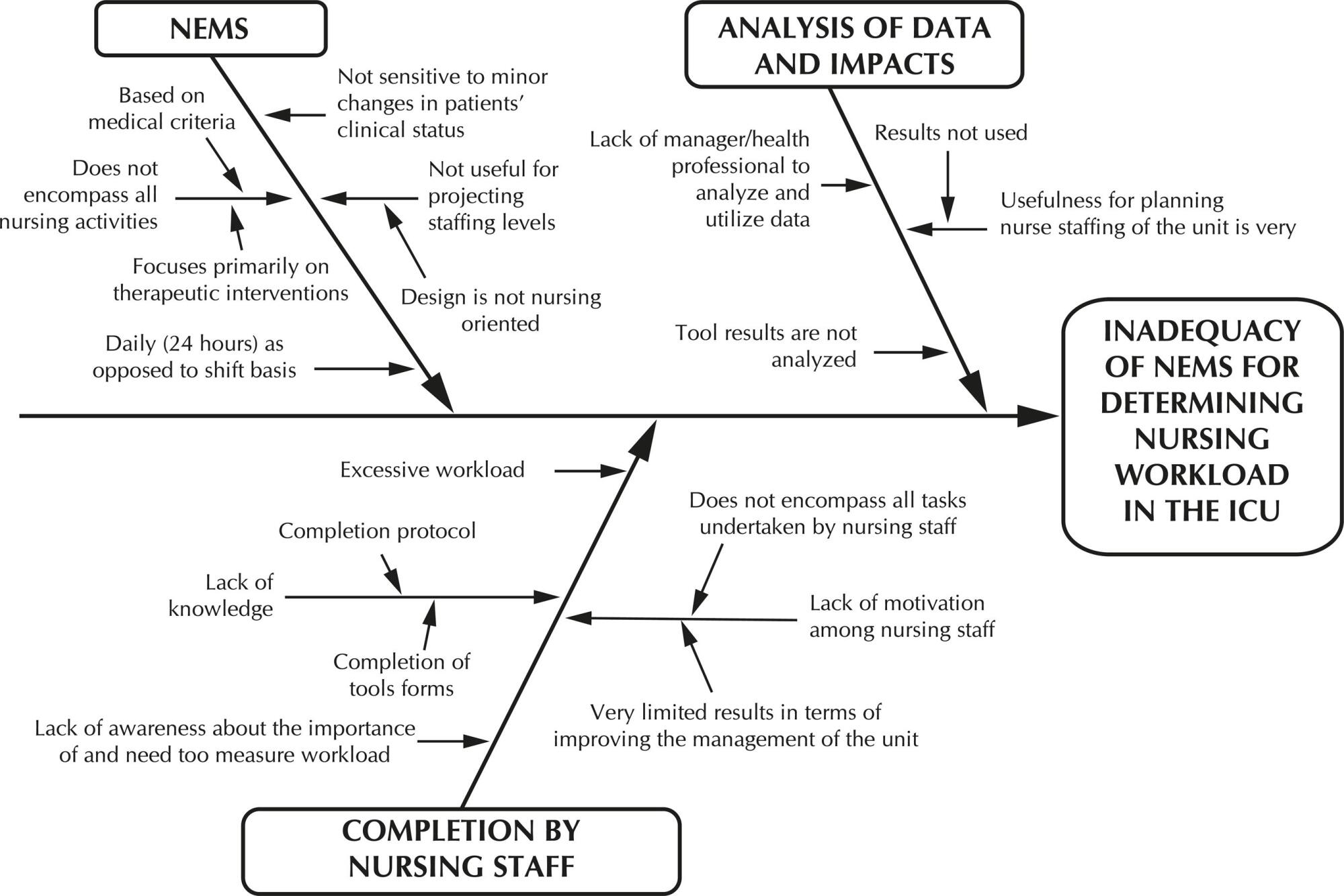
-
01-01-2017
Educational nursing intervention to reduce the hyperphosphatemia in patients on hemodialysis
Revista Brasileira de Enfermagem. 2017;70(1):31-38
Abstract
Educational nursing intervention to reduce the hyperphosphatemia in patients on hemodialysis
Revista Brasileira de Enfermagem. 2017;70(1):31-38
DOI 10.1590/0034-7167-2016-0015
Views0See moreABSTRACT
Objective:
to evaluate the effectiveness of an educational nursing intervention to reduce hyperphosphataemia in chronic renal patients on hemodialysis.
Method:
quasi-experimental study with 63 hyperphosphatemic patients on hemodialysis. The intervention consisted of developing and providing a printed and illustrated manual to patients containing information on disease control. The participant was asked to complete a daily checklist with the aim to reinforce aspects provided in the manual. Laboratory tests and itching intensity were analyzed at the beginning of the study, and at 30 and 60 days after the educational intervention.
Results:
the mean age of participants was 58±13.1 years, with a treatment time of 51.1±44.7 months. A reduction in serum phosphorus values of 7.06 ± 1.43 to 5.80 ± 1.53 (p <0.001) and the intensity of itching after the intervention was observed.
Conclusion:
the educational nursing intervention was effective in reducing phosphate and decreasing itching in hyperphosphatemic patients.
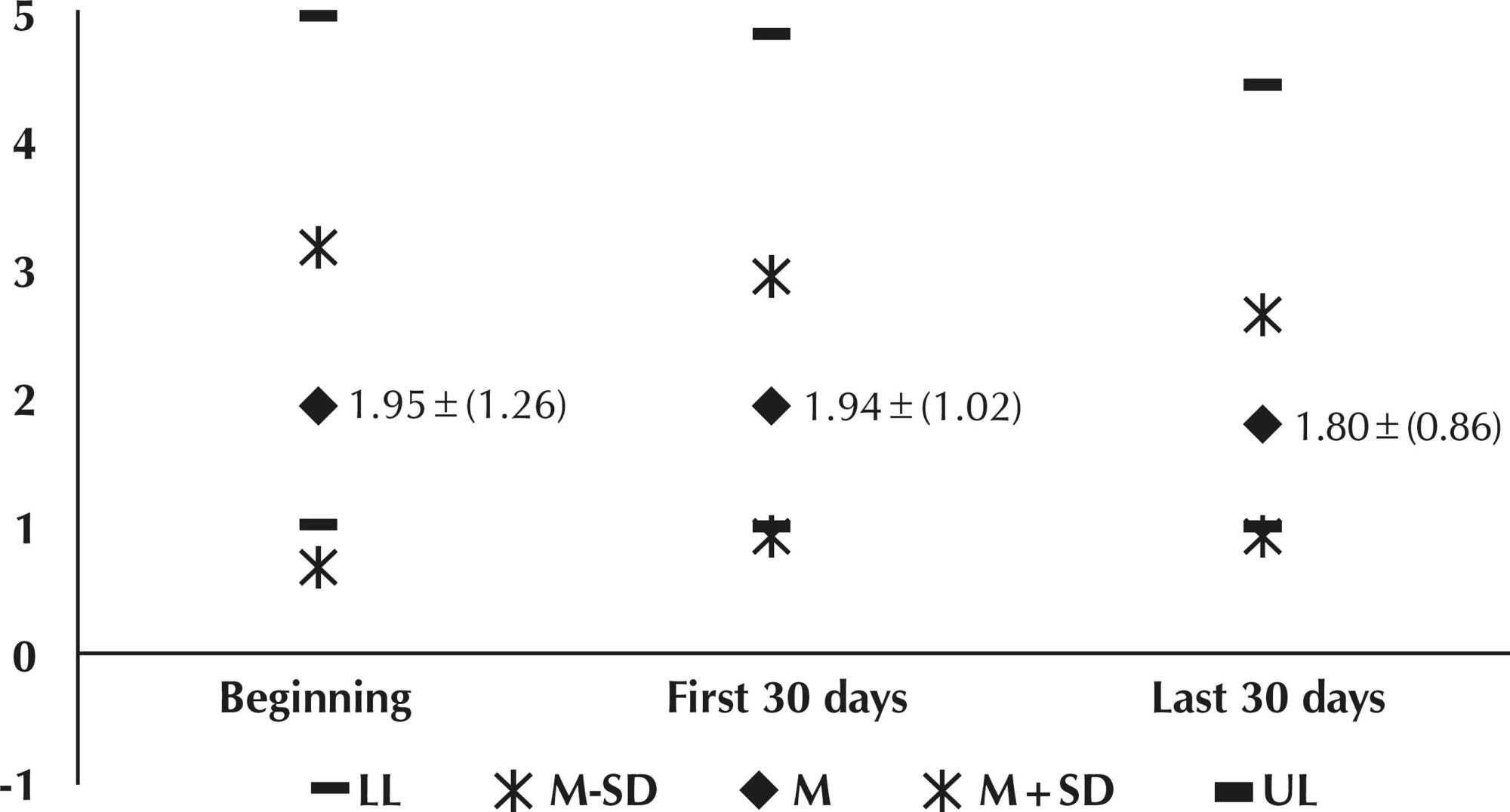
-
01-01-2017
Filial care and the relationship with the elderly in families of different nationalities
Revista Brasileira de Enfermagem. 2017;70(1):22-30
Abstract
Filial care and the relationship with the elderly in families of different nationalities
Revista Brasileira de Enfermagem. 2017;70(1):22-30
DOI 10.1590/0034-7167-2015-0050
Views0See moreABSTRACT
Objective:
identify how filial care and the relationship with the elderly occur in families of different nationalities.
Method:
qualitative study carried out in a town on the triple frontier of Paraná, comprising 33 elderly people of five different nationalities, adopting the Symbolic Interactionism and the Grounded Theory as theoretical-methodological strategy.
Results:
among Lebanese people, the Muslim religion teaches children to obey and respect parents; among French, distant family relationships and institutions for the elderly stand out. Paraguayans hold close family relationships; Chinese people consider filial care as a tacit obligation; Brazilians, in turn, tend to embrace and take care of their parents in old age.
Conclusion:
family care prevailed, but the traditions of each society lead the actions of that care, demanding health professionals’ capacity of recognizing in which context the elderly is inserted.
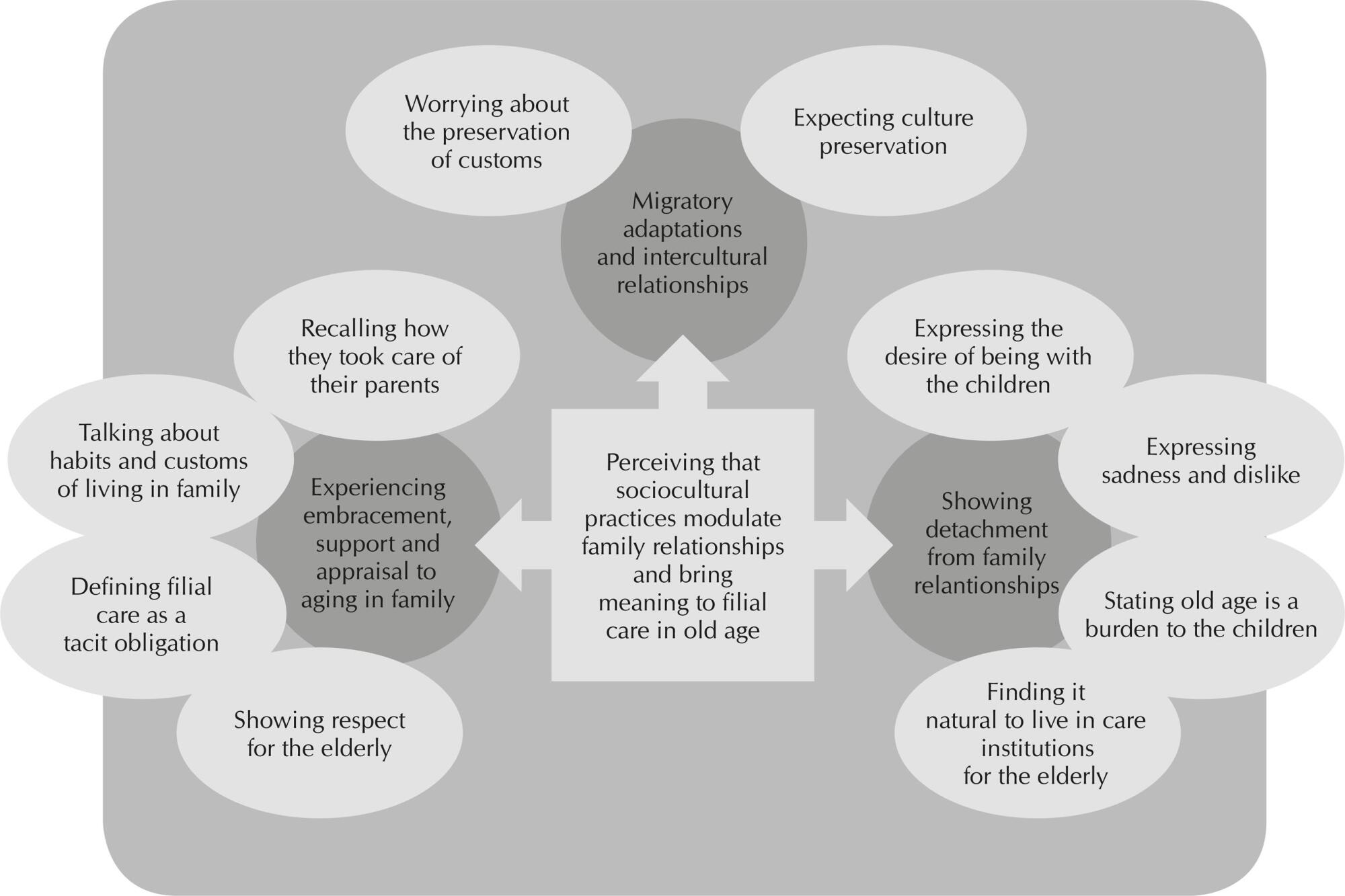
-
01-01-2017
Excesso de volume de líquidos: análise clínica e sociodemográfica em pacientes de hemodiálise
Revista Brasileira de Enfermagem. 2017;70(1):15-21
Abstract
Excesso de volume de líquidos: análise clínica e sociodemográfica em pacientes de hemodiálise
Revista Brasileira de Enfermagem. 2017;70(1):15-21
DOI 10.1590/0034-7167-2015-0138
Views0See moreRESUMEN
Objetivo:
analizar las características definitorias y los factores relacionados con el diagnóstico enfermero de exceso de volumen líquido y su relación con variables sociodemográficas y clínicas en pacientes de hemodiálisis.
Método:
estudio transversal, realizado mediante un formulario y examen físico, con una muestra de 100 pacientes, entre diciembre de 2012 y abril de 2013 en un hospital universitario y una clínica de diálisis.
Resultados:
se encontraron 10 asociaciones estadísticamente significativas entre las características definitorias, factores relacionados de volumen de exceso de líquido y las variables sociodemográficas y clínicas.
Conclusión:
las características definitorias y los factores relacionados de exceso de volumen líquido podrían estar influenciados por variables sociodemográficas y clínicas en clientes de hemodiálisis.
-
01-01-2017
Excess fluid volume: sociodemographic and clinical analysis in haemodialysis patients
Revista Brasileira de Enfermagem. 2017;70(1):15-21
Abstract
Excess fluid volume: sociodemographic and clinical analysis in haemodialysis patients
Revista Brasileira de Enfermagem. 2017;70(1):15-21
DOI 10.1590/0034-7167-2015-0138
Views0See moreABSTRACT
Objective:
To analyse the defining characteristics and related factors in the nursing diagnosis Excess fluid volume and its relationship to sociodemographic and clinical variables in haemodialysis patients.
Method:
Cross-sectional study, conducted using a form and physical examination, with a sample of 100 patients, between December 2012 and April 2013 at a university hospital and a dialysis clinic.
Results:
It was found 10 significant statistical associations between the defining characteristics/ related factors of Excess fluid volume and the sociodemographic and clinical variables.
Conclusion:
The defining characteristics and related factors of Excess fluid volume could be influenced by sociodemographic and clinical variables in haemodialysis clientele.
-
01-01-2017
Facing challenges in times of adversity
Revista Brasileira de Enfermagem. 2017;70(1):1-2
Abstract
Facing challenges in times of adversity
Revista Brasileira de Enfermagem. 2017;70(1):1-2
DOI 10.1590/0034-7167.2017700101
Views0At the confluence of tradition, respect for history and a critical approach to the issues inherent to the development of the nursing profession, the Brazilian Nursing Association (ABEn) has been consolidating an exemplary trajectory in Brazilian society. Throughout its history, the reflections, discussions and decisions on pertinent and urgent subjects of the profession have made […]See more -
01-01-2017
Enfrentando desafios em tempos de adversidades
Revista Brasileira de Enfermagem. 2017;70(1):1-2
Abstract
Enfrentando desafios em tempos de adversidades
Revista Brasileira de Enfermagem. 2017;70(1):1-2
DOI 10.1590/0034-7167.2017700101
Views0Na confluência da tradição, do respeito pela história e da abordagem crítica das questões inerentes ao desenvolvimento da profissão de enfermagem, a Associação Brasileira de Enfermagem (ABEn) vem consolidando uma trajetória exemplar na sociedade brasileira. Ao longo da sua história, as reflexões, discussões e decisões sobre assuntos pertinentes e prementes da profissão têm possibilitado intervenções […]See more -
01-01-2016
Epistemology of nursing care: a reflection on its foundations
Revista Brasileira de Enfermagem. 2016;69(6):1240-1245
Abstract
Epistemology of nursing care: a reflection on its foundations
Revista Brasileira de Enfermagem. 2016;69(6):1240-1245
DOI 10.1590/0034-7167-2016-0331
Views0See moreABSTRACT
Objective:
to reflect on nursing care and its epistemology from its historical, theoretical, philosophical, spiritual dimensions and as a social practice.
Method:
discussions originated in the discipline “Epistemology of caring”, from the graduate nursing program of the School of Nursing, Federal University of Minas Gerais, and in critical analysis of nursing literature together with the professional practice of the authors.
Results:
we identified the necessity of developing a critical conscience on health care provision, research, and teaching, as well as on challenges in maintaining high standards of working interpersonal relationships, which has a profound impact on population health.
Conclusion:
we suggest the rescue of integrality, humanization, unity, and spirituality in researches and practices of individual, familiar, and community care, as an advance in incorporating epistemology of caring in nursing.
Search
Search in:
Nuvem de Tags
Adolescente (85) Atenção Primária à Saúde (239) COVID-19 (91) Criança (91) Cuidados de Enfermagem (269) Educação em Enfermagem (151) Educação em Saúde (139) Enfermagem (930) Enfermagem Pediátrica (86) Estudantes de Enfermagem (77) Estudos de Validação (131) Família (87) Idoso (208) Promoção da Saúde (99) Qualidade de Vida (104) Saúde do Trabalhador (86) Saúde Mental (145) Saúde Pública (82) Segurança do Paciente (150) Tecnologia Educacional (100)



